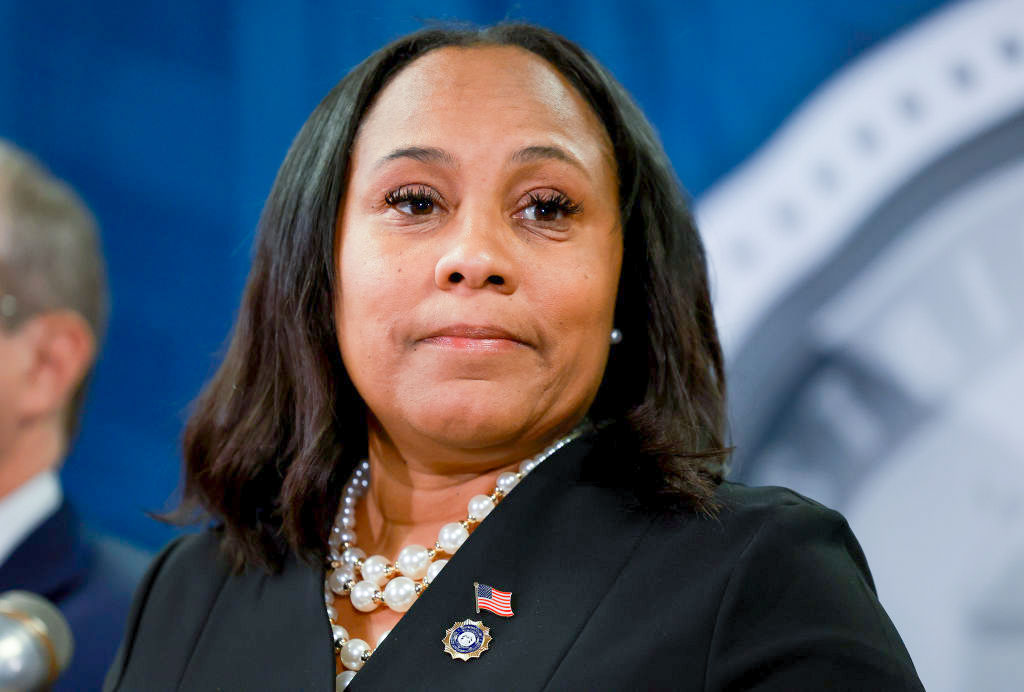A judge in Georgia had allowed prosecutor Fani Willis to continue participating in the case despite a move to disqualify her.
The Georgia Court of Appeals has canceled a scheduled oral argument over prosecutor Fani Willis’s continued participation in the election case against President-elect Donald Trump and various codefendants.
“The oral argument scheduled to take place on December 5, 2024 at 10:30 a.m. is hereby canceled until further order of this Court,” the brief order on Nov. 18 reads.
The case stemmed from Fulton County Superior Court Judge Scott McAfee’s ruling that allowed Willis to continue participating in the case despite a move to disqualify her.
Willis came under fire earlier this year for her romantic relationship with Nathan Wade, one of the prosecutors working with her on the case.
The Epoch Times reached out to one of Trump’s attorneys in the case for comment.
It’s unclear what prompted the appeals court’s order. Meanwhile, Trump’s other criminal cases seemed poised to end after his electoral victory this month.
The order followed Special Counsel Jack Smith’s request for the U.S. Court of Appeals for the 11th Circuit to pause his ongoing challenge to a lower court ruling that dismissed his prosecution against Trump in Florida.
Both his filing to the 11th circuit and another filing to D.C. Judge Tanya Chutkan cited Department of Justice policy. After the election, the special counsel’s office declined comment on the cases but pointed The Epoch Times to longstanding DOJ policy against the prosecution of sitting presidents.
A 2000 memo from the DOJ states that “indictment or criminal prosecution of a sitting president would unconstitutionally undermine the capacity of the executive branch to perform its constitutionally assigned functions.”
Smith is expected to file a follow-up brief for both the D.C. and Florida cases by Dec. 2.
Willis’s office would likely face constitutional hurdles if she tried to continue prosecuting Trump. Experts have also told The Epoch Times that the Constitution’s supremacy clause would preclude the possibility of Trump serving prison time as a result of either of his state-based criminal cases.
New York Supreme Court Justice Juan Merchan was expected to release a ruling earlier this month on Trump’s request to reject the guilty verdict he received over allegedly falsifying business records. Merchan postponed ruling on Trump’s motion, which argued that the verdict and indictment should be thrown out based on presidential immunity.
Trump was one of 19 people charged in Willis’s prosecution last year.
Among the co-defendants listed in Georgia were former Trump advisers, including Rudy Giuliani and his former chief of staff, Mark Meadows.
Heritage Foundation Vice President John Malcolm said the supremacy clause would likely interfere with Willis’s attempt to continue the prosecution but noted that the question of state prosecutors continuing against presidents was a “brand new question.”
“There’s nothing that would prevent a state prosecutor from prosecuting a sitting president,” Georgia criminal defense attorney Keith Johnson told The Epoch Times, “especially when that individual was the president when the alleged offense occurred.”
Outside Willis’s potential disqualification, the Georgia case faced another setback after the judge overseeing the case, Fulton County Superior Court Judge Scott McAfee, dismissed two counts from the indictment in September—leaving just five of the 13 original criminal counts.
Experts agreed that Trump could not pardon his co-defendants upon entering office, given that his pardon power doesn’t extend to state-level prosecutions.
The order followed Republican attorneys general’s letter insisting that Willis, Smith, and New York Attorney General Letitia James discontinue their prosecutions of Trump.
“As the chief legal officers in our States, we write to strongly encourage you to discontinue your political prosecutions of President Trump,” the state attorneys general from Florida, Texas, and other states said. “While each of these prosecutions should never have been brought in the first place, they now risk fomenting a Constitutional crisis.”
James had won a civil fraud lawsuit against Trump earlier this year but the case went before an appeals court in September. It’s unclear how the judges in that case will rule but some seemed skeptical of James’s application of the state’s anti-fraud law.

